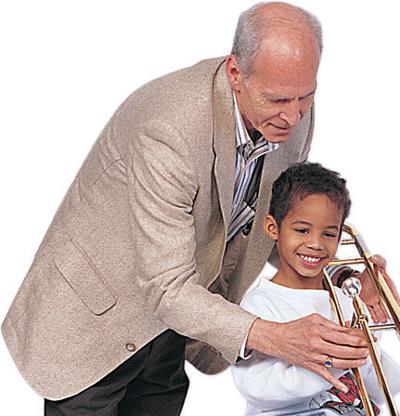Does Music Education Improve Academic Performance?
The education a child receives will set the groundwork for future success. There is a strong connection between edu-cational achievement and music education. Data from the College Board, Profile of College-Bound Seniors National Report for 2001, revealed that for every year a student par-ticipated in music instruction, their SAT scores improved significantly. Students with four or more years of music study received an average score of about 544 as opposed to a score just above 482 for those with at least one semester of music instruction, thus showing a strong correlation between music lessons and academic success.
Grade-school music students also show increased learning in math and reading. The Public Schools of Albuquerque, N.M., conducted a study that found that instrumental-music students with two or more years of study scored significantly higher in the California Test of Basic Skills than did non-music students.
High school students also achieve greater academic excel-lence when exposed to music training. A study by Mission Veijo High School in Southern California (1981) shows that the overall grade point average of music students is consistently higher than the grade point average of their non-music peers. The music students achieved a 3.59 average while the non-music students achieved a lower 2.91 average.
Dr. Earnest Lamb is the chair of the Department of Performing and Fine Arts at Fayetteville State University. Prior to accepting the position at Fayetteville State, Dr. Lamb taught orchestra in the public schools of Little Rock, Ark. He later joined the faculty at the University of Arkansas at Pine Bluff before coming chair of its music department. Lamb found that music education encouraged students to stay in school because it improves their self-esteem, and those music educational activities give students a sense of belonging.
For example, the students in the marching band, the glee club, choir or any other performing ensembles have an enhanced feeling of satisfaction and pride in their school. Having pride gives the students a reason to stay in school. Lamb has found that, especially in public schools, the lead-ers and the academic achievers were almost always involved in performing-arts programs.
Lamb further noted that even the top-tier engineering and science universities have musical ensembles composed of students who had a background that included music lessons.
Just 15 minutes a week of private keyboard instruction, along with group singing at pre-school, dramatically im-proved a kind of intelligence needed for high-level math and science, suggests a new study. 
Music lessons appear to strengthen the links between brain neurons and build new spatial reasoning, says Psychologist Frances Rauscher of University of California-Irvine. “Music instruction can improve a child’s spatial in-telligence for long periods of time — perhaps permanently,” Rauscher told the American Psychological Association meeting according to the study in 1997.
Her study compared 19 preschoolers who took the lessons and 14 classmates enrolled in no special music programs. After eight months, she found:
• A 46 percent boost in spatial IQs for the young musicians
• A 6 percent improvement for children not taught music
“If parents can’t afford lessons, they should at least buy a musical keyboard ... or sing regularly with their kids and involve them in mu-sical activities,” Rauscher said.
Photo: There is a strong connection between educational achievement and music education.

 How to resolve AdBlock issue?
How to resolve AdBlock issue? 








